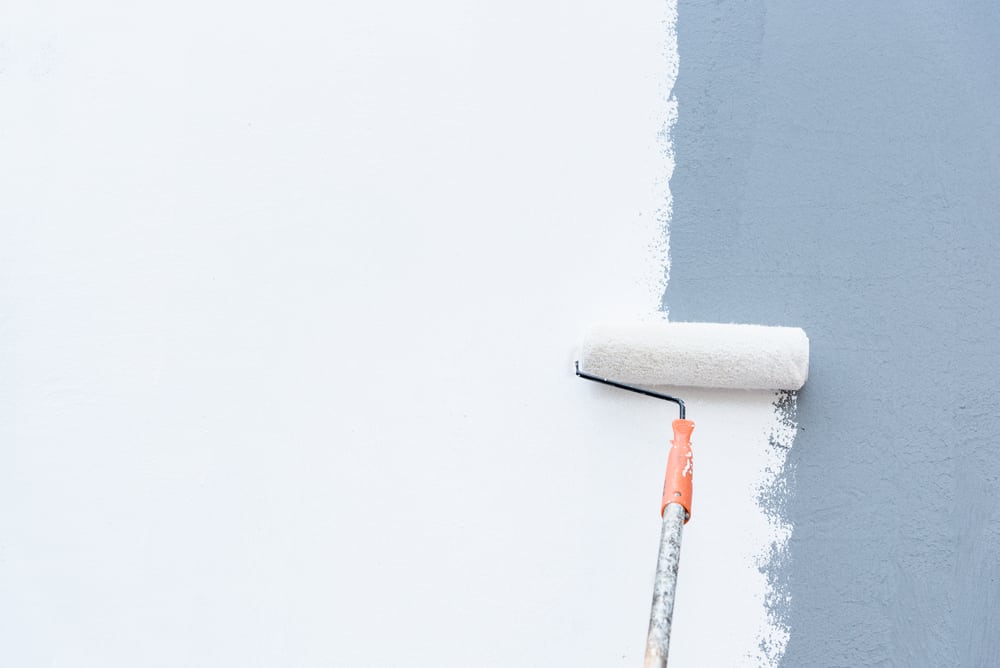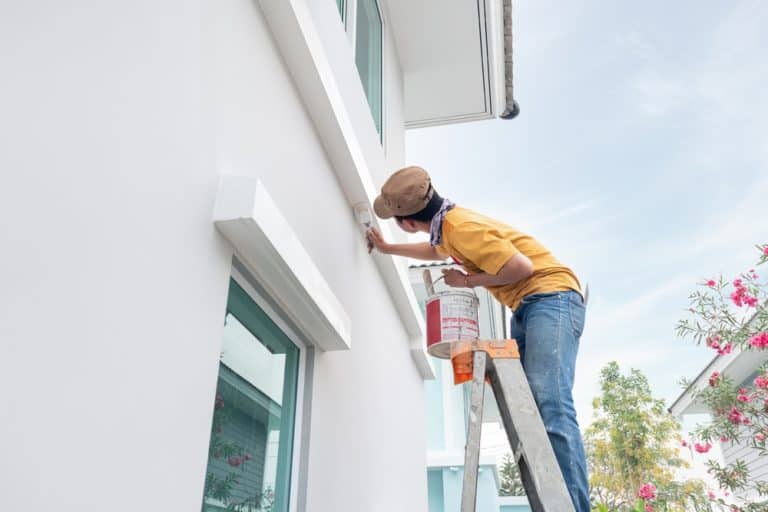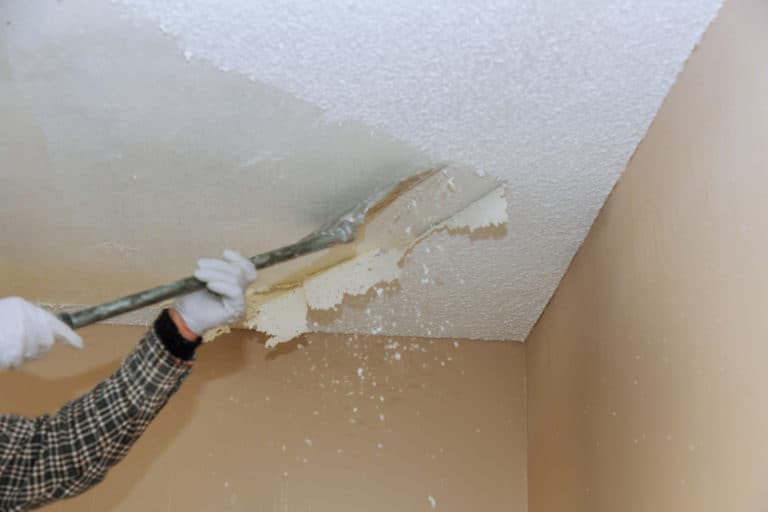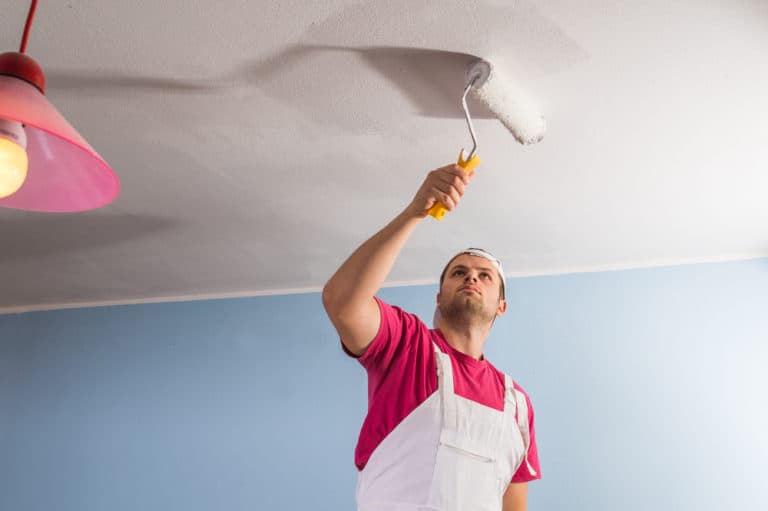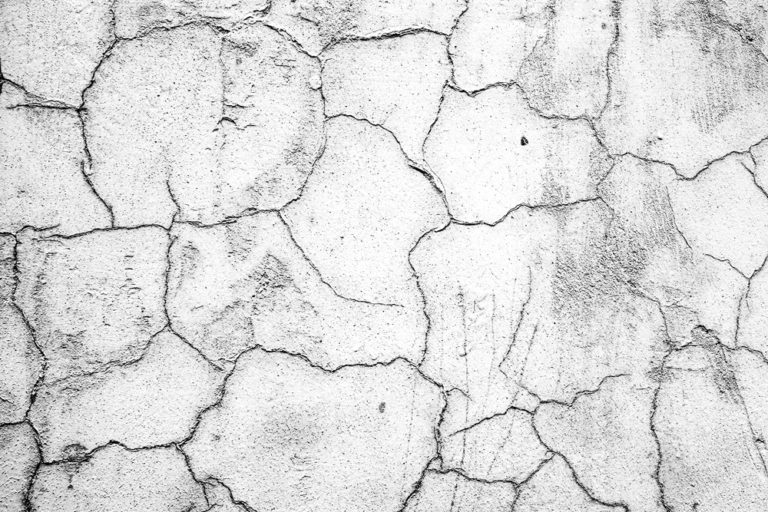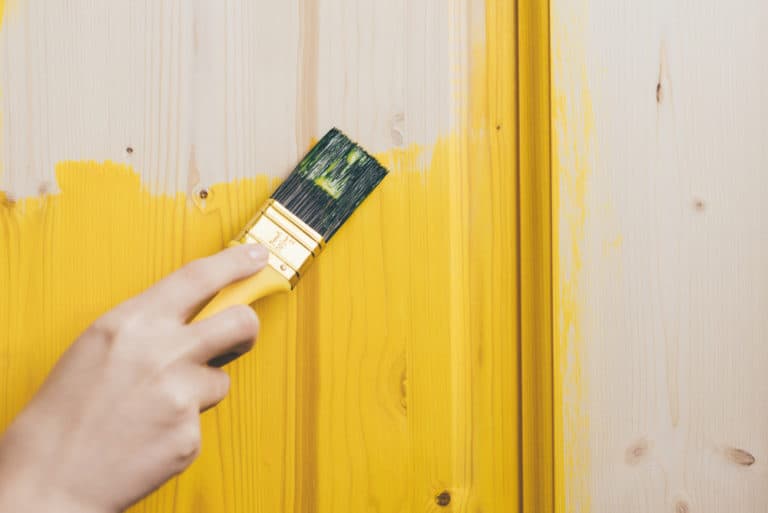How Long Does Paint Smell Last In A House?
Painting your home’s interior is a great, cost-effective renovation project. However, even once you’ve waited for the paint coats to dry, the paint fumes will continue to linger. Due to this, many homeowners have wondered how long their homes will smell of paint fumes.
How long paint fumes last after painting a home depends on the type of paint that is used. With regular paints containing Volatile Organic Compounds (VOCs), smells can last anywhere between 14 and 24 weeks before fully dissipating. With low-VOC and no-VOC, paint smells will only last for a few days.
We’re going to explain what you need to know about lingering paint fumes in your home. Once we’ve discussed how long these smells tend to last, we’ll look at whether these fumes are harmful, how to avoid inhaling them, and effective ways to remove the paint smell from your home.
How Long Does Paint Smell Last In Homes?
In order to understand how long paint smells will last in your home, you need to understand the four main components that comprise paints. Of course, these are pigments, binders, solvents, and additives.
While pigments are used to achieve the desired color, binders help paints dry faster. Solvents are used to dissolve the pigment and binders into the paint. Finally, additives like VOCs (Volatile Organic Compounds) are added to enhance the thickness and durability of the paint.
When the ingredients in paint react with the air, paint smells or fumes are released. While these paint smells can result from many of the chemicals in the mixture, VOCs are the largest contributor and are considered the most harmful. These VOC additives can transform from liquid or solid states to gas, which is where the paint smell typically comes from.
Once paints with VOC additives start drying, these fumes become more intense. Generally, fumes will subside within a few days but can last for months. Overall, these fumes will take between 14 and 24 weeks to dissipate fully. Of course, this means homeowners may be stuck with that unwanted paint smell for a couple of months.
Ultimately, the severity of the smell and how long it lasts will depend on the type of paint that was used. For instance, water-based paints will use smaller quantities of VOCs than solvent-based paints. There are also many ways to aid the removal of these fumes from your home, which can also reduce the amount of time these fumes take to disappear.
In addition to these regular VOC paints, there are now low-VOC and no-VOC paints available to consumers. These specialized paints use less Volatile Organic Compounds than other paints. Low-VOC paints typically have less than 50 grams of VOCs per liter, while no-VOC paints will have less than 5 grams of these harmful additives.
With low-VOC and no-VOC paints, the resulting fumes will be less intense. Furthermore, these fumes will also dissipate faster than paints with higher VOC content. With low-VOC paints, these resulting fumes will dissipate within four days. Of course, odors caused by no-VOC paints will clear even faster, typically within two days.
To summarize this, regular paints with VOCs will take between 14 and 24 weeks for the smell to vanish. Low-VOC paints, on the other hand, only take four days for fumes to dissipate, while the fumes of no-VOC paints dissipate within two days.
Can You Sleep In A Freshly Painted House?
Earlier in this article, we discussed how paint fumes are formed and how long they take to subside. Of course, the amount of time the paint fumes take to dissipate depends on the type of paint you use. However, you may be wondering how long you need to wait to sleep in your freshly painted home.
Ultimately, this depends on the type of paint you used and how many VOCs are used in it. As a golden rule, people should wait at least three days (72 hours) before sleeping in a freshly painted room. Within three days, the paint fumes will have subsided, and the room will be safe to sleep in again.
However, this is just a general guideline. Once you notice the paint fumes have largely subsided, you’ll be able to sleep in a freshly painted room. However, it’s important that you wait at least three days, as these fumes can have adverse effects.
Are Paint Fumes Harmful When Inhaled?
The chemicals present in paint fumes, particularly VOCs, can cause short- and long-term health effects when the fumes are inhaled. Ultimately, this is the reason homeowners are advised to wait 72 hours before sleeping in a freshly painted room. Let’s look at some of the short-term and long-term health effects linked to inhaling paint fumes.
Paint Fumes Can Cause Irritations
When paint fumes are inhaled, the fumes can cause your skin, eyes, or throat to become irritated. For those with allergies, these irritations could be more severe. Regardless of the specific type of irritation, getting some fresh air will help alleviate your symptoms.
If your skin is irritated, you can wash the affected area with soap and water. If the fumes irritate your eyes, you should rinse your eyes with running water for at least ten minutes before closing them for another ten minutes. If your throat becomes irritated, drinking small amounts of milk or water can reduce symptoms.
Paint Fumes Can Cause Headaches, Dizziness, And Nausea
Paint fumes have also been known to cause headaches, dizziness, and nausea when inhaled. This is particularly common in poorly ventilated areas. If you notice any of these symptoms, you should get some fresh air immediately.
Once again, this will help alleviate your headache, dizziness, or nausea. If these fume-related symptoms do not subside, you should seek medical attention or call Poison Control (800-222-1222).
Paint Fumes Can Cause Breathing Difficulties
When using paints with chemicals like VOCs in them, the fumes can result in breathing difficulties. For those with conditions like asthma, these fumes can be particularly harmful. Those with difficulty breathing should steer clear of these fumes.
In fact, studies have shown that prolonged exposure to VOCs can result in organ and nervous system damage. This is a testament to how harmful these chemicals can be when inhaled, which leads us to our last point regarding the long-term effects of inhaling paint smells.
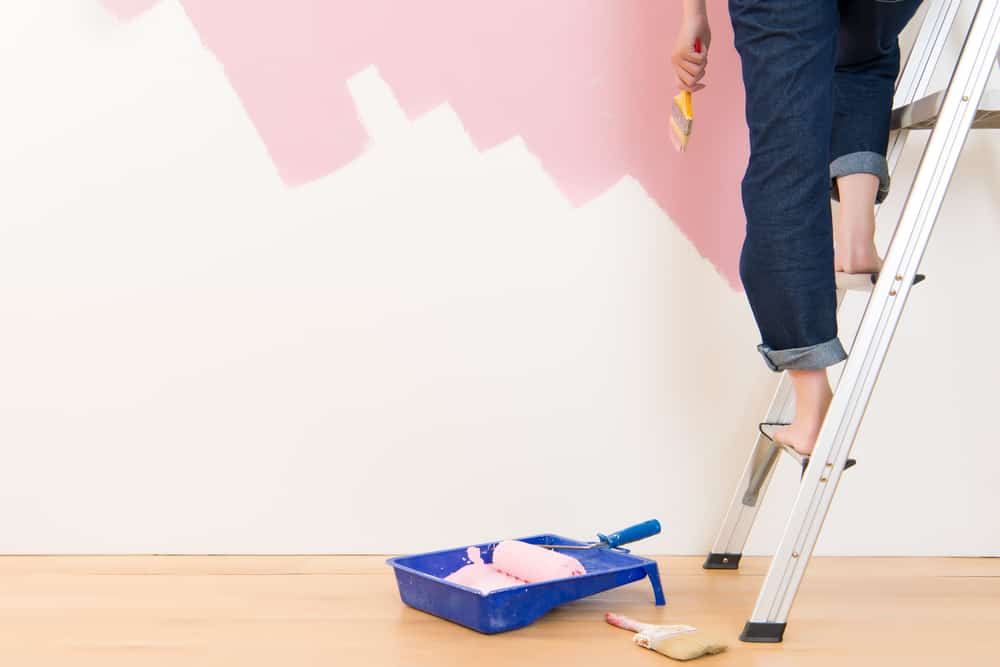
Paint Fumes Can Have Long-Term Effects
In addition to the short-term health effects of breathing in paint fumes, these fumes pose the risk of long-term health effects. As we mentioned above, this is typically due to prolonged exposure to fumes. These long-term effects impact the nervous system, liver, and kidneys.
Furthermore, certain people are more inclined to develop these long-term side effects. Pregnant women and those over 65 years of age are particularly susceptible to these harmful fumes. Given that experts are still determining the exact ways these fumes can harm the human body, it’s important that homeowners understand different ways to avoid inhaling these chemical fumes.
8 Ways To Avoid Inhaling Paint Fumes
If you’ve recently painted your house, you’re going to be dealing with paint fumes for a while. Before we look at the best methods of removing these fumes from your house, let’s consider ways you can avoid inhaling these harmful fumes. After all, regardless of the paint you use, these fumes will linger in your home for at least a few days.
#1: Use Indoor Paints For Your Home
When painting your home, you should ensure that you use paints rated for indoor use. These paints are formulated to produce less harmful fumes in your home. Using outdoor paints can result in excessive paint smells throughout your home.
#2: Ready Safety Information First
Before you start painting, it’s important to read any provided safety information first. Your paint’s manufacturer will provide any necessary warnings or first-aid information.
#3: Consider Protective Measures
Depending on the paint you’re using, you may want to take additional protective measures. By using gloves, goggles, and a face mask, you can avoid inhaling these smells as you paint your home. This will ensure your skin, eyes, and throat do not become irritated by the fumes.
#4: Paint In Ventilated Areas
While painting your home, you want to ensure that there is sufficient ventilation to reduce the potency of the paint smells. When painting in poorly ventilated areas, you will be more at risk for the health effects linked to these fumes.
#5: Take Breaks While Painting Your Home
While painting your home, you should regularly take breaks. As we mentioned earlier, fresh air can help mitigate the short-term health effects of these paint fumes.
#6: Use Low-VOC Or No-VOC Paints
As we discussed earlier, paints with little to no VOCs produce less potent smells. Once these paints have dried, the fumes will dissipate within a couple of days.
#7: Close Paint Containers When Not In Use
Where possible, you should ensure paint containers are properly closed. When paint cans are left open, the chemicals can continue leaking into your home. Of course, this will result in paint fumes lingering for longer. Any leftover paint should be carefully discarded.
#8: Use A Professional Painting Service
If you’re worried about inhaling harmful paint fumes, you can always consider using a professional service to paint your home. For those susceptible to the health risks posed by paint fumes, this would be advised.
8 Ways To Remove Paint Smells From Your Home
Earlier, we looked at the best ways to avoid inhaling paint fumes. Now, let’s look at how you can effectively remove paint smells from your home. From increasing ventilation to using charcoal, there are many methods you can use to remove these fumes from your home.
#1: Increase Your Home’s Ventilation
If you’ve recently painted your home, it’s vital that you increase ventilation so that the remaining smells can dissipate. In addition to using windows, strategically placed fans can help remove paint fumes from your home.
#2: Use Baking Soda To Absorb Paint Fumes
There are many ways to use baking soda when dealing with bad odors – including paint smells. By sprinkling baking soda in recently painted rooms, you can ensure the smell is dealt with quickly. However, cleaning the sprinkled baking powder can be a bit messy.
#3: Use Onions To Remove Paint Smells
Onions are another great way to effectively deal with these chemical fumes. Depending on how many painted rooms you’re dealing with, you’ll want to cut a few onions in half. These onion halves can be placed on plates in different rooms to deal with the paint smells.
#4: Fill Bowls With White Vinegar To Reduce Paint Fumes
White vinegar is another household ingredient that can be used to effectively deal with these harmful fumes. There is acetic acid in vinegar, which helps neutralize molecules that create odors and smells. You can fill a few bowls with white vinegar and place them in painted rooms to remove the paint smell from your home.
#5: Light Candles To Deal With Paint Fumes
Candles alone won’t remove all the paint fumes from your home, but they can help! Candle flames burn VOC particles in the air, which helps deal with paint smells. When using candles to deal with these fumes, you should use natural beeswax or soy-based candles.
#6: Use Lemons To Reduce Paint Smells
Lemons can also be used to reduce paint smells around your home. Like onions, the lemons should be cut in halves and placed on plates throughout the house.
#7: Sprinkle Coffee Grounds In Painted Areas
Sprinkling coffee grounds function similarly to baking powder. By sprinkling coffee grounds throughout your painted house, you can ensure the grounds absorb the fumes.
#8: Use Charcoal To Absorb Paint Fumes
Finally, charcoal can be used to absorb paint fumes. The porous nature of charcoal makes it a great method of absorbing paint fumes. Both deactivated and activated charcoal can be used in this regard. The charcoal should be placed on a metal baking tray and left overnight.
Conclusion
How long paint fumes linger in a house depends on the type of paint that was used. With regular VOC paints, smells can take up to 24 weeks to dissipate. With low-VOC and no-VOC paints, however, fumes can dissipate in under 4 days. There are many ways to prevent inhaling these toxic fumes and just as many ways to effectively remove these paint smells from your home!
Sources
- https://www.marthastewart.com/8125286/how-long-paint-takes-dry
- https://homeworkspainting.com/understanding-vocs-paint-odor/
- https://www.healthline.com/health/paint-fumes
- https://time.com/5619823/paint-fumes-harmful-research
- https://ecospaints.net/low-voc-paint-vs-no-voc-paint
- https://www.lung.org/clean-air/at-home/indoor-air-pollutants/volatile-organic-compounds
- https://paintersvilla.com/how-long-does-paint-smell-last/

